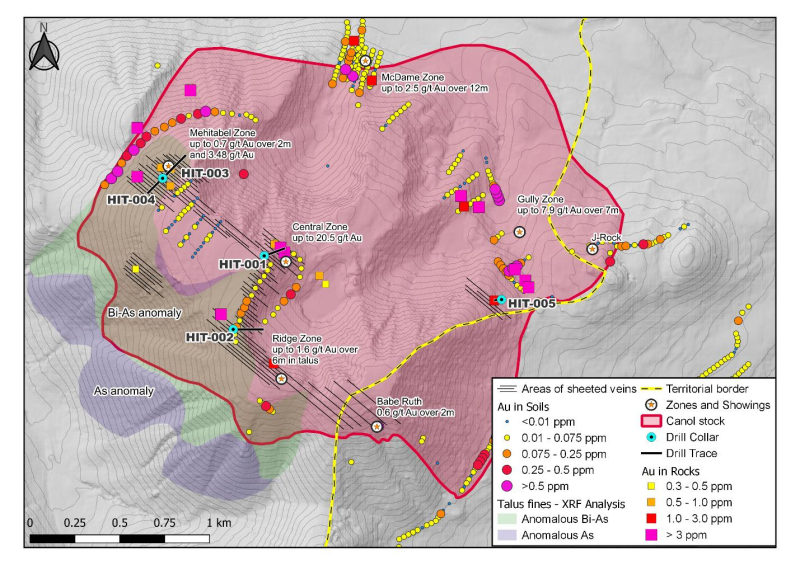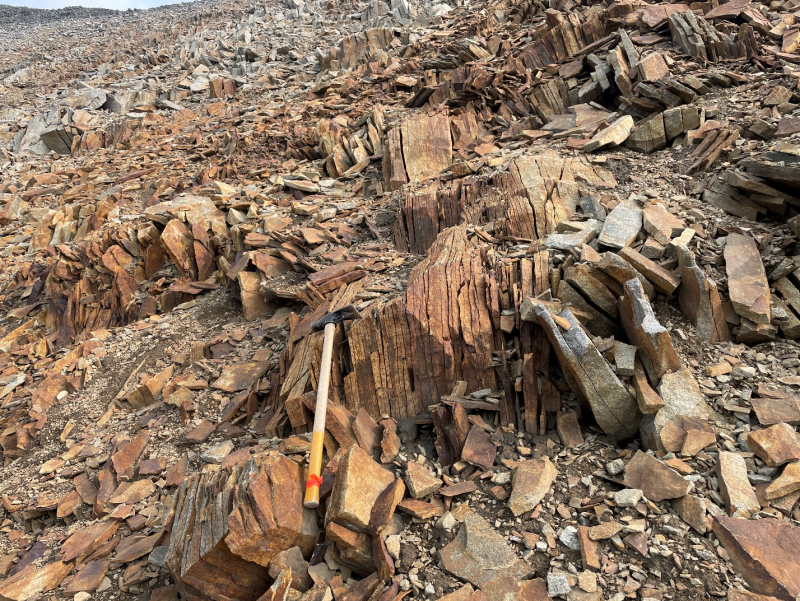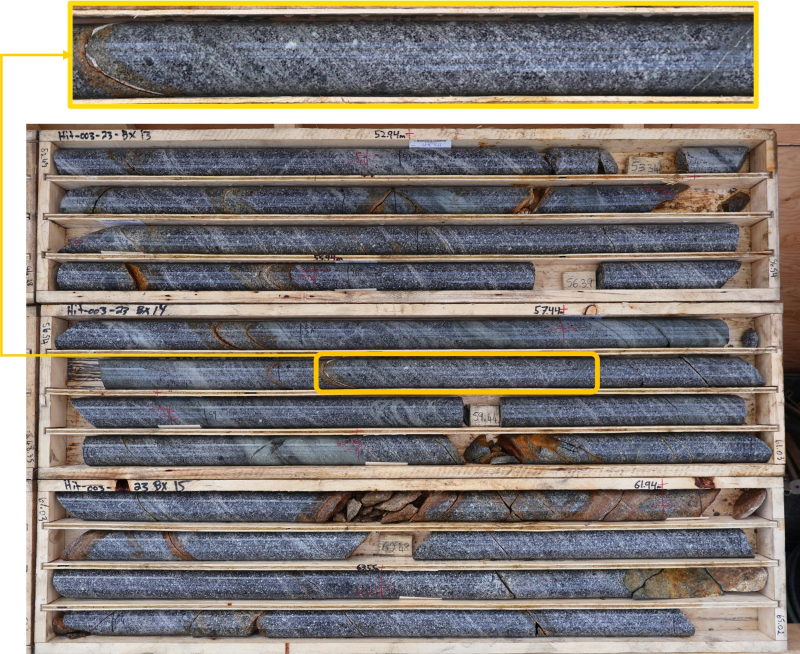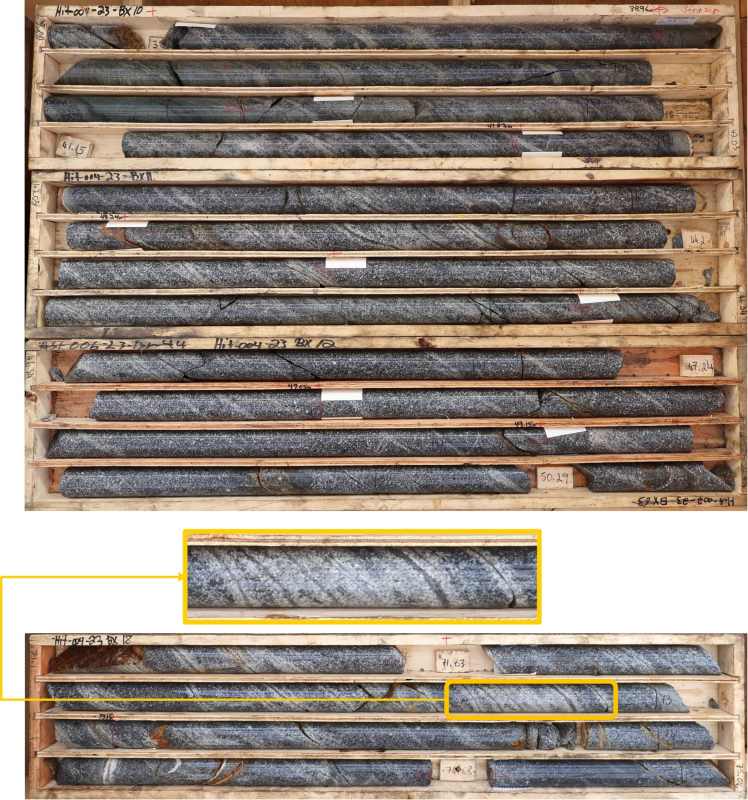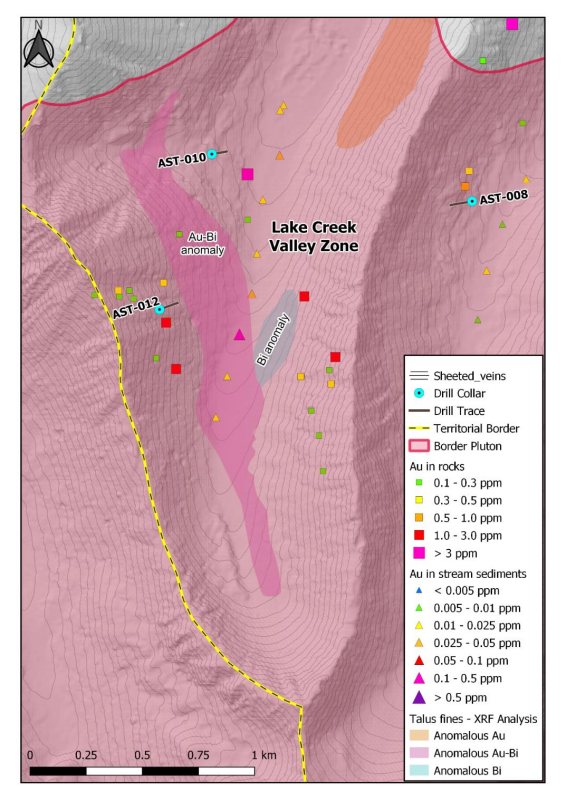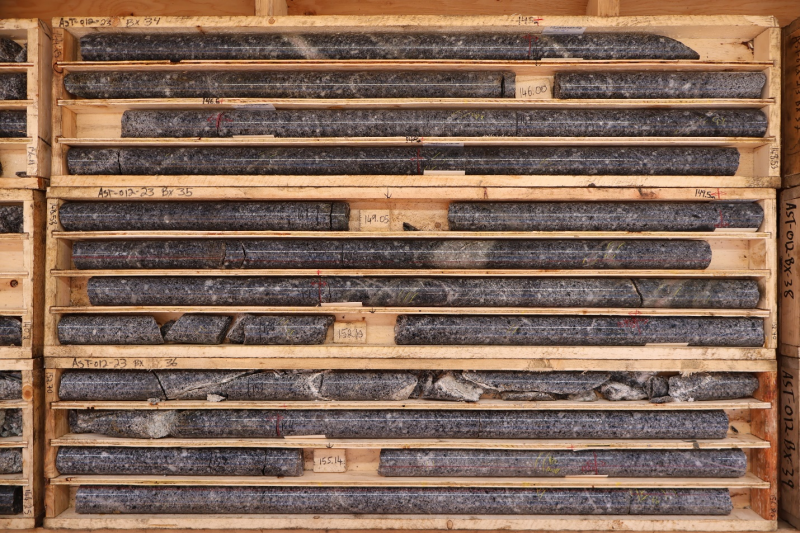Archive
Rackla Metals Announces Completion of 2023 Field Program and Includes Hit and Astro Core Photos
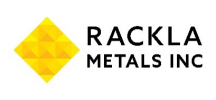 | |||||||||
 |  |  |  |  | |||||
Vancouver, British Columbia – September 26, 2023 – Rackla Metals Inc. (TSXV:RAK) (the “Company”) is pleased to announce that the Company has completed its 2023 exploration program that included 3,039 m of diamond drilling in 17 holes focused on Reduced Intrusion-Related Gold Systems (RIRGS) at the Astro intrusive complex, in the eastern Selwyn Basin of Yukon and NWT. The Astro intrusive complex is comprised of the Astro, HIT and SER properties. Twelve holes (2,041.3 m) were drilled on the Astro property and 5 holes (997.5 m) were drilled on the HIT property.
The HIT property covers the Canol Trail Stock, a K-feldspar porphyritic biotite monzogranite belonging to the Cretaceous-aged Tungsten Suite (Figure 1). Seven mineral occurrences have been identified on the property, each exhibiting characteristics of RIRGS, including: magnetic low in the intrusion with a magnetic high in the altered sedimentary rocks around the margins, sheeted quartz-sulphide veining in the intrusion, a gold-bismuth-arsenic chemical association.
Figure 1. HIT property compilation map showing 2023 drill hole locations.
Figure 2. Slabs of monzogranite sub-crop at the Mehitabel occurrence exhibiting preferential weathering of sulphide minerals from sheeted quartz-sulphide veins creating the thin slabs on surface.
The drill program on the HIT property tested a high priority 1,500 m by 1,000 m Au/Bi/As anomaly defined by soil, rock and talus fine sampling. The anomaly is associated with a northwest trending structural corridor exhibiting strong sheeted veining in the Canol Trail Stock. Four holes (HIT-001 to HIT-004) tested the Mehitabel, Central, and Ridge zones. Hole HIT-005 tested the Gully Zone.
HIT-001 intersected stockwork veining in the Central Zone while HIT-002 intersected similar veining 400 m south towards the Ridge Zone.
Holes HIT-003 and HIT-004 were drilled 700 m along strike to the northwest of HIT-001 targeting an area of highly fractured, sheeted veins at the Mehitabel Showing (Figure 2). HIT-003 and HIT 004 cut a zone of intensely sheeted quartz (Qtz)-pyrrhotite (Po)-arsenopyrite (Aspy)-bismuthinite (Bi)-chalcopyrite (Cpy) veining that measures approximately 290 m in width and includes intervals with up to 55 veinlets per metre and quartz-sulphide veins up to 3 m wide (Figure 3).
Figure 3. Cross section of holes HIT-003 and HIT-004 at the Mehitabel Zone with sheeted Qtz-Po-Aspy-Bi-Cpy vein density.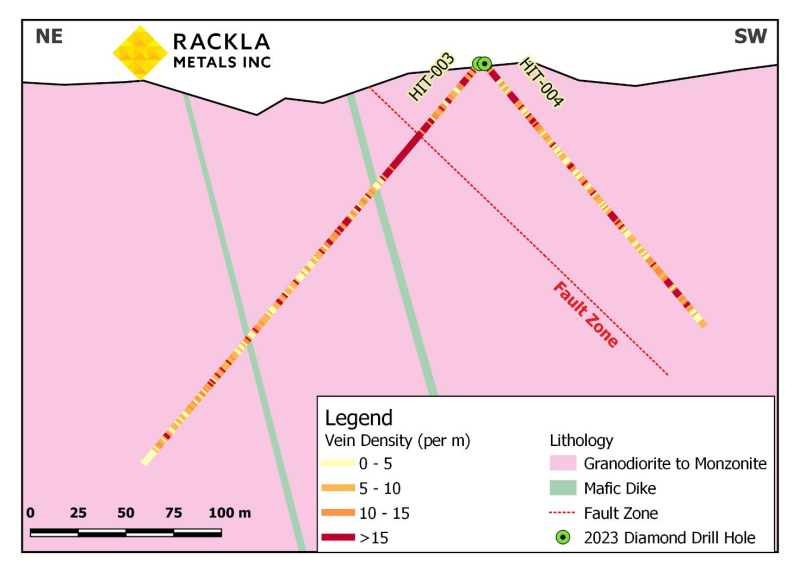
Click Image To View Full Size
In hole HIT-003, the intense sheeted veining was consistent over the entire 273 m drill hole and averaged approximately 12 veins per metre. Most of the veins have sericite-carbonate altered selvages and there are variable amounts of carbonate-filled microfractures in the host granodiorite (Figure 4).
Figure 4. Sheeted Qtz-Po-Aspy-Bi-Cpy veins in hole HIT-003.
HIT-004 was drilled from the same pad as HIT-003 in the opposite direction and cut the steeply southwest dipping sheeted veins at a slightly lower angle but the veining and alteration was comparable to HIT-003 for most of the 178.31 m hole (Figure 5). These 2 holes tested a section of this structural corridor measuring 290 m in width and to a depth of 210 m vertically below surface. The sulphide-bearing veins observed in the drill core demonstrate how the effects of surface weathering and oxidation of the sulphide minerals create the slabs of monzogranite observed on surface.
Figure 5. Sheeted Qtz-Po-Aspy-Bi-Cpy veins in hole HIT-004.
HIT-005 was drilled on the southeast corner of the HIT property to test a hornfelsed block of silty-limestone sediments within the monzogranite. Due to mechanical problems the hole was abandoned at 50 m, just short of the targeted zone.
The final drill hole of the program, hole AST-012, was drilled at the Lake Creek Valley prospect in the Border Pluton on the Astro property. The Border Pluton is a biotite-hornblende-clinopyroxene granite intrusion that belongs to the Cretaceous-age Tombstone Suite. In 2023, Rackla discovered a new showing at Lake Creek Valley. The occurrence consists of a broad slope of weathered, iron-stained slabs of granite, similar to the slabs of monzogranite observed at the Mehitabel occurrence. The occasional un-weathered quartz-sulphide vein was observed to contain pyrrhotite, arsenopyrite, and molybdenite. Talus fine sampling along the base of the valley returned anomalous gold, bismuth, arsenic, and molybdenum (Figure 6).
Hole AST-012 intersected granite from the top of the hole with an average sheeted vein density of 2.8 veins per metre up to 12 veins per metre (Figure 7). The veins contained quartz-pyrite-pyrrhotite-bismuthinite-arsenopyrite-molybdenite+chalcopyrite.
Figure 6. Drill hole AST-012 tested talus fine gold-bismuth anomaly in the Lake Creek Valley, Astro property.
Figure 7. Sheeted Qtz-Po-Aspy-Cpy-Bi veins in hole AST-012.
Final analytical results are expected within the coming weeks.
Sample Analysis
Drill core samples have been delivered to the ALS Global preparatory facility in Whitehorse, Yukon. Sample preparation was completed in Whitehorse, with analyses completed in Vancouver.
ALS Global is accredited to ISO/IEC 17025 and ISO9001 for quality management. Rock and drill core samples were crushed to >85% passing below 2 mm and split using a riffle splitter. 250 g splits were pulverized to >70% passing below 75 microns. An aqua regia digestion with an inductively coupled plasma mass spectroscopy (ICP-MS) and inductively coupled plasma atomic emission spectroscopy (ICP-AES) finish was used for 51-element analysis on 0.5 g sample pulps (ALS code: ME-MS41). All samples were analysed for gold content by fire assay with an atomic emission spectroscopy (AES) finish on 50 g samples (ALS code: Au-ICP22).
Core photos for the complete holes are available for the HIT property, HIT–003 and 004 and the Astro property, AST–012 at:
https://racklametals.com/projects/tombstone-gold-belt-properties/#core-photos
Qualified Person
Scott Casselman, B.Sc., P.Geo., Vice-President Exploration of the Company, is a member of the Association of Professional Engineers and Geoscientists of British Columbia and is the Company’s Qualified Person as defined by National Instrument 43-101. Mr. Casselman has reviewed and approved the technical information contained in this news release.
About Rackla
Rackla Metals Inc. (TSX-V: RAK) is a Vancouver, Canada based junior gold exploration company. The Company is targeting RIRGS (Reduced Intrusion-Related Gold System) mineralization on the southeastern part of the Tombstone Gold Belt in eastern Yukon and western Northwest Territories. Management believes that this area, which is underexplored for RIRGS deposit types, has the potential to be the next frontier for their discovery.
ON BEHALF OF THE BOARD
Simon Ridgway,
CEO and Director
Tel: (604) 801-5432; Fax: (604) 662-8829
Email: info@goldgroup.com
Website: www.racklametals.com
Neither the TSX Venture Exchange nor its Regulation Services Provider (as that term is defined in the policies of the TSX Venture Exchange) accept responsibility for the adequacy or accuracy of this press release.
Forward-Looking Information
Certain statements contained in this news release constitute forward-looking statements within the meaning of Canadian securities legislation. All statements included herein, other than statements of historical fact, are forward- looking statements and include, without limitation, statements about the Company’s exploration activities. Often, but not always, these forward looking statements can be identified by the use of words such as “estimate”, “estimates”, “estimated”, “potential”, “open”, “future”, “assumed”, “projected”, “used”, “detailed”, “has been”, “gain”, “upgraded”, “offset”, “limited”, “contained”, “reflecting”, “containing”, “remaining”, “to be”, “periodically”, or statements that events, “could” or “should” occur or be achieved and similar expressions, including negative variations.
Forward-looking statements involve known and unknown risks, uncertainties and other factors which may cause the actual results, performance or achievements of the Company to be materially different from any results, performance or achievements expressed or implied by forward-looking statements. Such uncertainties and factors include, among others, changes in general economic conditions and financial markets; the Company or any joint venture partner not having the financial ability to meet its exploration and development goals; risks associated with the results of exploration and development activities, estimation of mineral resources and the geology, grade and continuity of mineral deposits; unanticipated costs and expenses; and such other risks detailed from time to time in the Company’s quarterly and annual filings with securities regulators and available under the Company’s profile on SEDAR at www.sedar.com. Although the Company has attempted to identify important factors that could cause actual actions, events or results to differ materially from those described in forward-looking statements, there may be other factors that cause actions, events or results to differ from those anticipated, estimated or intended.
Forward-looking statements contained herein are based on the assumptions, beliefs, expectations and opinions of management, including but not limited to: that the Company’s stated goals and planned exploration activities at its properties will be achieved; that there will be no material adverse change affecting the Company or its properties; and such other assumptions as set out herein. Forward-looking statements are made as of the date hereof and the Company disclaims any obligation to update any forward-looking statements, whether as a result of new information, future events or results or otherwise, except as required by law. There can be no assurance that forward-looking statements will prove to be accurate, as actual results and future events could differ materially from those anticipated in such statements. Accordingly, investors should not place undue reliance on forward-looking statements.
